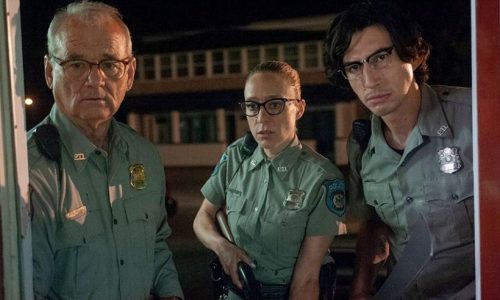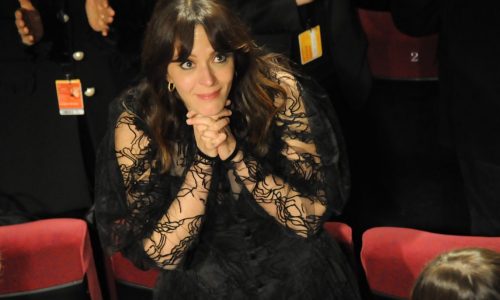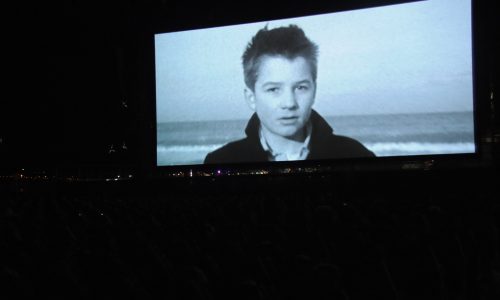Themes often come out of no-where at Cannes, and just weeks after a Swedish teenager brought the issue of climate change back to the forefront of global politics, the subject is recurring down here on the Croisette.

At a news conference to introduce the main awards jury ahead of the opening of the 72nd Festival de Cannes, the jury president, the Mexican director Alejandro González Iñárritu delivered a scathing attack on what he called the “ignorance” of political leaders, while – in his words – “the world is melting.”
Just minutes into the Opening Film of the festival – Jim Jarmusch’s zombie comedy The Dead Don’t Die, the issue was back. In his offbeat satire, the dead start coming back to life in the town of Centerville, because the Earth has been knocked off its axis by what they call “polar fracking” – a subtle but frequent reference to the world’s ongoing reliance on fossil fuels and its perceived effect on everyone. That’s not to say, of course, that the director is trying to say that unless we switch to renewable energy, we’re all going to turn into zombies – or is it?
It’s presented more as a throwaway piece of back-story, repeated for comic effect, than as a message being rammed down your throat. The film itself is a curiosity – certainly entertaining, but despite the underlying warning about climate change, without the kind of depth that would be expect not just of a festival opener but of a competition entry.
As the two local police officers who first realise what’s going on, Bill Murray and Adam Driver deliver some cracking one-liners in Jarmusch’s inimitable deadpan style, with their junior colleague Chloe Sevigny fulfilling more of the role of the audience – being led on a frightening journey of discovery. With a string of enjoyable cameos – such as Steve Buscemi’s farmer, Tilda Swinton’s undertaker and Jarmusch regular Tom Waits as the local hermit – there’s much to enjoy, but somehow, it simply doesn’t add up to the sum of its parts. Running out of ideas – or unsure of what to do with the ones he has – Jarmusch relies too heavily on repeating the good gags that he has and breaking some cinematic conventions, which – while suitably offbeat for the surrounding material – knocks any attempt at a coherent narrative off-course. One running joke is Driver’s cop frequently predicting that “in the end, everything’s going to turn out bad.” Sadly, his prediction isn’t far off.
Having ticked the opening film off my to-do list, it was time to wander around the Marche du Film to get my bearings. I’ve been coming to this combination of festival market for two decades, but each year the organisers throw in little tweaks to catch you out, so it’s always useful to spend some time at the start to check the lay of the land. Some things don’t change – as I queued for the airport-style metal-detectors and bag-check, to get into my first film, I suddenly remembered how – in the past – security have stolen my day’s supply of snacks, and shoved my banana chips and mini-cheddars into my trouser pockets where, surely even the food police wouldn’t check. Mercifully, I got away with it, enabling me to settle down on one of the press terraces to recharge both my phone battery and my body, when it suited me, rather than the powers that be. No-one is going to complain about a policy that stops the people sitting around you crunching through the films, but to confiscate your chocolate as if it – and its owners – pose a security threat goes just a little too far.
The afternoon was full of the typical Cannes encounters – accidental and planned – that makes this home-from-home such a peculiar experience for so many old hands; thousands of miles from home, you just bump into people you know from across the industry, from as far and wide as Los Angeles, South Africa and New Zealand.
During a brief moment of down-time at the UK Film Centre, I overheard a typical conversation at the next table involving BFI figures advising the organiser of an Italian film festival on what British films might be available for him next year. He said he was happy to take films that had already been seen in Toronto, but not any that had been previously seen at Venice, indicating the importance to festivals of having if not a world premiere, at least the premiere for their own country.
There seem to be more opportunities to see the films this year, which is good – but the flipside is that with more screenings comes more potential for clashes so better planning is needed to squeeze in the films, news conferences and panel events and you have to make sure you see the films in the order that fits your own schedule. With an interview lined up for tomorrow, it was important that I saw the opening film of the official festival sidebar, Un Certain Regard.
The French Canadian actress, Monia Chokri, is a contender for the Camera d’Or for the Best First Film for her sibling relationship comedy-drama La Femme de mon Frère – translated here as A Brother’s Love – in which a woman has to reassess her relationship with her brother when he falls in love with her doctor.

As the opening film of the event, it was preceded by the Festival’s head honcho Thierry Frémaux introducing the Un Certain Regard jury, headed by the Lebanese director Nadine Labaki, who told the audience that she could empathise with Chokri, having been sitting in the audience only last year as a panel judged her own film, Capharnaüm, in the Official competition. She also thanked Frémaux for helping directors like her, noting that her home country was not the most supportive of women in her profession. Then the proceedings unwound in a more predictable style, with the Chokri thanking her cast up on stage before the film and accepting a rousing standing ovation afterwards.
It was very much a Cannes standing ovation, with the film – like the aforementioned official competition opener The Dead Don’t Die – having a handful of delightful laugh-out-loud moments but a narrative that wouldn’t get past the readers at most film studios. Part of the problem here was that the outbursts from the protagonist were too often over-the-top and the way the plot eventually unfolded bore little reality to the kind of realism or cinematic conventions that this kind of film is built on.

Despite Cannes laying on high profile works from veterans and newcomers alike, perhaps the highlight of this writer’s first Wednesday at Cannes was screened on the beach after dark – Francois Truffaut’s classic tale of the honorable child delinquent, Les 400 Coups.
It was the film that started it all for me – and for Truffaut – starting my film journey by getting me passionate about cinema during my French A Levels – and earning him a Best Director award when the film played here at Cannes, back in 1959.
Sometimes, even at Cannes, where every competition film has to be a world premiere, the old ones are the best.
